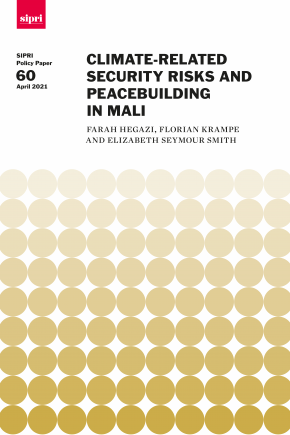Climate-related Security Risks and Peacebuilding in Mali
Climate-related security risks are changing the security landscape in which multilateral peacebuilding efforts are taking place. Following a similar assessment of the United Nations Assistance Mission in Somalia in 2019, this SIPRI Policy Paper offers another glimpse into the future of peacebuilding in the context of climate change, this time by providing an in-depth assessment of the UN Multidimensional Integrated Stabilization Mission in Mali (MINUSMA).
Climate change in Mali has affected natural resource-based livelihoods and contributed to undermining human security in a context of conflict and weak governance. Furthermore, the compound character of climate change is an increasingly strong factor that reshapes social, political and economic contexts, thereby potentially amplifying local grievances and marginalization. These interactions all contribute to hindering MINUSMA’s efforts to support peace and stability in Mali.
MINUSMA, however, explicitly and implicitly responds to climate-related security risks. For example, its divisions address natural resource-related conflicts, supporting peace and stability in a context where natural resources are often crucial to livelihoods and human security. MINUSMA also works to reduce its own potential negative environmental impact. Nevertheless, it faces three main limitations in addressing climate-related security risks: prioritization of the issue vis-à-vis the mandate, limited capacity within the mission, and coordination challenges between the mission and the UN Country Team.
By analysing how climate change affects MINUSMA’s mandate, and the mission’s responses to it, the insight offered in this paper suggests the need for increased knowledge, training and prioritization surrounding climate security. This applies not only to MINUSMA, but also to other missions located in areas of high climate change exposure, and more generally to the broader UN system.
1. Introduction
2. Conflict and peacebuilding efforts in Mali
3. Climate change in Mali
4. Climate impacts on MINUSMA
5. Institutional responses to climate-related security risks
6. Limitations of current responses to climate-related security risks



